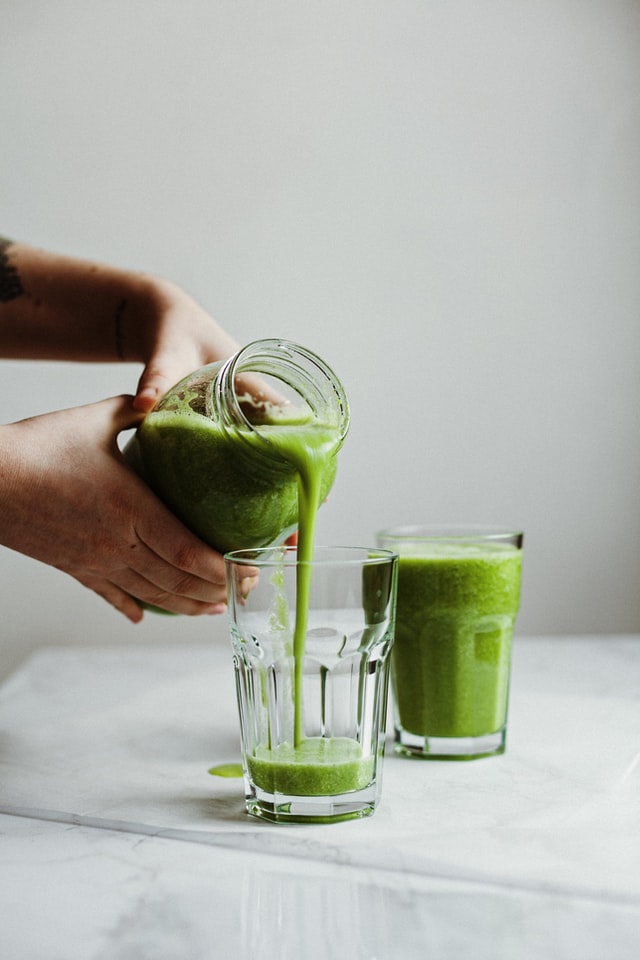


Just like every year, regardless of your skin type, dry winter skin is something that the bulk of us are concerned about, and for good reason. Itchy, flaky, and burning skin is downright not fun to deal with. Instead of relying solely on skincare products, there are also pivotal nutrients that will keep your skin hydrated naturally. Here’s the thing, if you’re not supporting your skin’s hydration and lipid layer internally, all the topical serums and tonics in the world aren’t going to make a dent long term. While using topicals can help boost your skin’s hydration, supporting your skin from within is something that often gets overlooked. Whether your skin is already suffering from a loss of moisture, or you’re looking to be proactive, take a look at these four nutrients that can help combat winter dehydration.
1. Vitamin D
Vitamin D is a fat-soluble vitamin that is critical for many aspects of health, including skin health. Vitamin D plays an integral role in skin barrier function and skin cell growth. As well as maintaining the skin’s immune system, which acts as the first line of defense against harmful pathogens. Because an overwhelming percentage of the population is deficient in vitamin D, and given that the nutrient is essential for skin hydration, supplementation may help combat dry skin. Along with supplementation, some simple vitamin D-rich foods to incorporate are wild-caught salmon, wild-caught herring and sardines, cod liver oil, and mushrooms.
2. Fatty Acids
Have you ever wondered why dermatologists and beauty enthusiasts recommend eating a good amount of wild-caught salmon and avocados for glowing skin? It’s because they are jam-packed with fatty acids that provide the building blocks for your skin’s lipids and cell membranes. Omega-3 and omega-6 fatty acids are paramount to skin function and appearance. They make up the outermost layers of skin cells that help with retaining moisture. Getting ample fatty acids in your diet will help your skin’s radiance. Research has shown that consuming healthy fats, like omega-3 fatty acids, can further support your skin, a la antioxidant photoprotection, hydration, and ultimately calm reactive skin. If implementing more fatty acids into your diet is appealing, try consuming foods like wild-caught salmon, wild-caught mackerel, wild-caught sardines, flax seeds, chia seeds, walnuts, and avocados.
3. Phytoceramides
Ceramides are a type of naturally occurring, long-chain fatty acids that make up approximately 50 percent of the epidermis, the skin’s outer layer. Phytoceramides on the other hand, refer to plant-derived ceramides. They have
a similar lipid structure to the ceramides found in our skin and may help replenish ceramide stores. While you can use ceramides topically, most of the science points to ingesting your phytoceramides from food and supplements. Research has shown that consuming these can further improve your moisture levels. In one study, individuals with dry skin who took a phytoceramide-rich wheat extract oil for three months saw up to a 35 percent improvement in skin hydration. However, in another study, participants saw a promising advancement in skin hydration just after 15 days . So whether you are looking to combat already dehydrated skin or want to be proactive, using phytoceramides can help you leverage those goals. Not to mention, studies have shown that phytoceramide supplementation improves skin elasticity and smoothness in just a few weeks. Some great food sources to include are soybeans, millet, wheat, spinach, rice, sweet potatoes, and konjac.
4. Antioxidants
As many of us know, antioxidants help neutralize free radicals, which not only impairs our barrier function but can lead to increased transepidermal water loss. Fortunately, eating a balanced diet full of vibrant fruits and vegetables can leave you with a healthy dose. But if you’re looking to up the ante, supplementation along with eating a plant-rich diet can specifically address hydration amongst other skin concerns. Astaxanthin, for example, has been shown to improve skin elasticity, moisture levels, and skin tone while also protecting the skin’s collagen layer. Moreover, research on pomegranate whole fruit extract found that the pomegranate extract increased skin’s resilience against UVB rays, as well as conferred positive changes to the skin microbiome. An easy way to incorporate more antioxidants into your diet is by eating a diversity of plant-rich foods. Try buying a few different varieties of vegetables, fruits, and whole grains each week that you commonly wouldn’t buy to ensure proper diversification.
Related Stories:
10 Supplements For Dry And Dehydrated Skin
Is Sunscreen Important In The Winter? Find Out Here
Confused By Moisturizer? We’re Here To Help
あなたは取り入れていますか?
冬の乾燥肌へ水分補給をサポートするために必要な4つの栄養素
肌のタイプに関係なく、乾燥した冬の肌状態はほとんど全ての人にとって悩みの種です。冬の乾燥肌には理由があります。 かゆみ、さかむけ、ひりひり感のある肌のケアはまったく楽しいものではありません。 スキンケア製品だけに頼るのではなく、肌の自然な水分補給するために極めて重要な栄養素もあります。セラムやトニックを局所的に使用することは肌の水分補給を促進するのに役立ちますが、内側から肌をサポートすることは見過ごされがちです。肌がすでに水分の喪失に苦しんでいる場合でも、冬の乾燥による肌の脱水状態と戦うために役立つこれらの4つの栄養素をご覧ください。
1.ビタミンD
ビタミンDは脂溶性ビタミンであり、皮膚の健康を含む、その他多くの健康に重要です。 ビタミンDは、皮膚バリア機能と皮膚細胞の成長に不可欠な役割を果たしています。 皮膚の免疫システムを維持するだけでなく、有害な病原体に対する防御の第一線として機能します。 人口のうち圧倒的な割合の人々がビタミンDを欠いています。栄養素が肌の水分補給に不可欠であることを考えると、サプリメントは乾燥肌と戦うのに役立つ可能性があります 。 サプリメントに加えて、組み込むべきいくつかの単純なビタミンDが豊富な食品は、養殖でないサーモン、野生で捕獲されたニシンとイワシ、タラの肝油、およびキノコです。
2.脂肪酸
皮膚科医や美容愛好家が、輝く肌のために天然の鮭やアボカドを大量に食べることを推奨する理由を疑問に思ったことはありませんか?それは、脂肪酸が詰まっていて、皮膚の脂質と細胞膜の構成要素を提供しているためです。オメガ3およびオメガ6脂肪酸は、皮膚の機能と見た目に重要です。これらのオイルは水分を保持するために重要な皮膚細胞の最外層を構成します。食事に十分な脂肪酸を含めると、肌の輝きが増します。研究によると、オメガ3脂肪酸などの健康的な脂肪を摂取することで、抗酸化作用、水分補給、そして落ち着いた肌バランスをキープできることがわかっています。より多くの脂肪酸を食事に取り入れることに魅力を感じる場合は、天然のサケ、サバ、イワシ、亜麻の種子、チアシード、クルミ、アボカドなどの食品を摂取してみてください。
3.植物性セラミド
セラミドは、皮膚の外層である表皮の約50%を構成する、天然に存在する長鎖脂肪酸の一種です。 一方、植物性セラミドとは、植物由来のセラミドを指します。植物がもつセラミドは、私たちの皮膚に見られるセラミドと同様の脂質構造であり、セラミドの貯蔵を補充するのに役立つ可能性があります。セラミドを局所的に使用することはできますが、ほとんどの科学では、食品やサプリメントから植物性セラミドを摂取できることを示しています。研究によると、これらを摂取することで水分レベルをさらに改善できることがわかっています。ある研究では、植物性セラミドが豊富な小麦抽出オイルを3か月間摂取した乾燥肌の人は、肌の水分保持力が最大35%改善しました。また、別の研究では、参加者は15日後に皮膚の水分保持力に有望な進歩が見てとれました。したがって、すでに脱水状態になっている肌と戦うことを考えている場合でも、より積極的に水分保持を促進したい場合でも、植物性セラミドを使用すると、これらの目標を達成するのに役立ちます。言うまでもなく、植物性セラミドの補給はわずか数週間で肌の弾力性と滑らかさを改善することが研究によって示されています。植物性セラミドが含まれるいくつかの素晴らしい食料源は、大豆、キビ、小麦、ほうれん草、米、サツマイモ、そしてこんにゃくです。
4.抗酸化物質
私たちの多くが知っているように、抗酸化物質はフリーラジカルを中和するのに役立ちます。酸化は皮膚のバリア機能を損なうだけでなく、表皮の水分喪失が深刻化する可能性があります。幸いなことに、活気に満ちた果物や野菜が豊富なバランスの取れた食事を食べることで、抗酸化物質を摂取することができます。しかし、あなたが更にバリア機能を上げることを意識しているのであれば、植物が豊富な食事を食べることと一緒にサプリメントは、他の皮膚の懸念の中で特に水分補給への対処に有効です。たとえば、アスタキサンチンは、肌の弾力性、水分レベルを改善することが示されています。肌のコラーゲン層を保護しながら、肌のトーンを整えます。さらに、ザクロの果実抽出物に関する研究では、ザクロ抽出物がUVB光線に対する皮膚の弾力性を高め(https://pubmed.ncbi.nlm.nih.gov/31601842/)、皮膚の微生物に前向きな変化をもたらすことがわかりました。より多くの抗酸化物質を食事に取り入れるための簡単な方法は、さまざまな種類の良質な食品を食べることです。多様化を確実にするために、通常は購入しない数種類の野菜、果物、全粒穀物を毎週購入してみてください。
関連記事:
乾燥肌のための10のサプリメント
冬に日焼け止めは重要ですか?
保湿剤選びに悩んでいませんか?